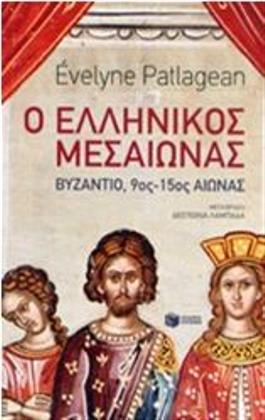
The Greek Middle Ages: Byzantium, 9th - 15th Century
"Byzantium occupies a paradoxical place in historiography. Compared with the slow formation of Western societies and the Turkish Muslim world, Byzantium appears as an extension of antiquity, which ends with the fall of Constantinople in 1453. It is believed by historians of the medieval period that this peculiarity is due in large part to “feudalism,” a political system that originated in the West and exclusively defined Europe, a Europe that is penned as “the fruit of invasions” by Marc Bloch. Looking back at the origin of this interpretation, Evelyne Patlagean proposes a review of Byzantine history from the 9th to the 15th century, in light of Marc Bloch’s classic historical study, “Feudal Society.”
(From the back cover of the book)
Patlagean, Evelyne. The Greek Middle Ages: Byzantium, 9ος-15ος Century. Athens: Patakis Publications, 2014. [949.5 PAT]
Byzantium occupies a paradoxical place in historiography. Compared with the slow formation of Western societies and the Turkish Muslim world, Byzantium appears as an extension of antiquity, which ends with the fall of Constantinople in 1453. It is believed by historians of the medieval period that this peculiarity is due in large part to “feudalism,” a political system that originated in the West and exclusively defined Europe, a Europe that is penned as “the fruit of invasions” by Marc Bloch.
Looking back at the origin of this interpretation, Evelyne Patlagean proposes a review of Byzantine history from the 9th to the 15th century, in light of Marc Bloch’s classic historical study, “Feudal Society.” Thus, the imperial environment, the aristocratic circles, the state machine are analyzed from the perspective of family and social relations, ties of loyalty and the organization of powers. Byzantine society appears under a new light, as a separate component of the medieval world.
“The Greek Middle Ages” attributes to Byzantium the position that corresponds to the long development of social structures and powers that originate in Roman society of late antiquity. The book also helps to dispel the perception that the Eastern Roman Empire had limited importance upon the Middle Ages, a viewpoint held by Western world historians even today.
(From the book’s back cover)
Κριτικές – Παρουσιάσεις
Ανθούλα Δανιήλ, Ο ελληνικός μεσαίωνας, diastixo.gr, 9.9.2014Σώτη Τριανταφύλλου, Ήταν το Βυζάντιο στην Ευρώπη;, www.bookpress.gr, 12.6.2014
Ξενοφών Μπρουντζάκης, Οι βυζαντινές καταβολές της Ευρώπης, "Το Ποντίκι", 21.8.2014
Δημήτρης Δουλγερίδης, Βιβλία για το καλοκαίρι, "The Books' Journal", τχ. 46, Αύγουστος 2014
Ενδεικτική βιβλιογραφία για τον βυζαντινό πολιτισμό στη βιβλιοθήκη
Εθνικό Ίδρυμα Ερευνών, Ινστιτούτο Βυζαντινών Ερευνών. Η καθημερινή ζωή στο Βυζάντιο: τομές και συνέχειες στην ελληνιστική και ρωμαϊκή παράδοση: πρακτικά Α’ διεθνούς συμποσίου, 15-17 Σεπτεμβρίου 1988. Αθήνα: Εθνικόν Ίδρυμα Ερευνών. Κέντρο Βυζαντινών Ερευνών, 1989. [949.5 ΚΑΘ]
Angold, Michael. Βυζάντιο: η γέφυρα από την Αρχαιότητα στο Μεσαίωνα. Αθήνα: Εκδοτικός Οργανισμός Λιβάνη, 2003. [949.5 ANG]
Ahrweiler, Helene. Γιατί το Βυζάντιο. Αθήνα: Ελληνικά Γράμματα, 2009. [949.5 ΑHR]
Beck, Hans-Georg. Η βυζαντινή χιλιετία. Αθήνα: Μορφωτικό Ίδρυμα Εθνικής Τραπέζης, 1990. [949.5 BEC]
Byzantium: a world civilization. Dumbarton Oaks, Washington D.C.: Dumbarton Oaks Research Library and Collection, 1992. [949.5 BYZ]
Cameron, Averil. Οι Βυζαντινοί. Αθήνα: Ψυχογιός, 2009. [949.5 CAM]
Guillou, Andre. Ο βυζαντινός πολιτισμός. Αθήνα: Ελληνικά Γράμματα, 1998. [949.5 GUI]
Kazhdan, Aleksandr. Αλλαγές στον βυζαντινό πολιτισμό κατά τον 11ο και 12ο αιώνα. Αθήνα: Μορφωτικό Ίδρυμα Εθνικής Τραπέζης, 1997. [949.503 ΚΑΖ]
Kean, Roger Michael. Ιστορικός άτλας της Βυζαντινής Αυτοκρατορίας. Αθήνα: Σαββάλας, 2006. [949.5 KEA]
Runciman, Steven. Βυζαντινός πολιτισμός. Αθήνα: Εκδόσεις Γαλαξία, [1970]. [949.5 RUN]
Sherrard, Philip. Byzantium. New York, N. Y.: Time-Life, 1996. [949.5 SHE]
